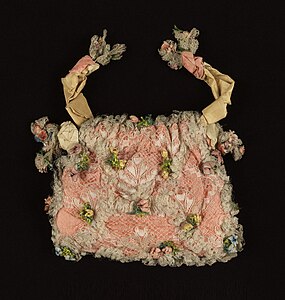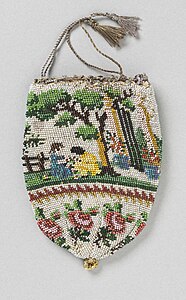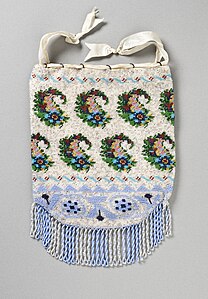
A reticule, also known as a ridicule or indispensable, was a type of small handbag or purse, similar to a modern evening bag, used mainly from 1795 to 1820.
The reticule became popular with the advent of Regency fashions in the late 18th century. Previously, women had carried personal belongings in pockets tied around the waist, but the columnar skirts and thin fabrics that had come into style made pockets essentially unusable. When the reticule first appeared, it was made of netting. As time went by, they were made from various fabrics, including velvet, silk, and satin.
A reticule usually had a drawstring closure at the top and was carried over the arm on a cord or chain. Reticules were made in a variety of styles and shapes and sometimes trimmed with embroidery or beading. Women often made their own reticules.
- Reticules in museums
-
 French, late 18th century
French, late 18th century
-
 European, c. 1810
European, c. 1810
-
 French, early 19th century
French, early 19th century
-
 Early 19th century
Early 19th century
-
 European, c. 1830
European, c. 1830
-
 English, 19th century
English, 19th century
-
 American, c. 1860
American, c. 1860
Etymology
According to the American Heritage Dictionary, the name "reticule" came from the French réticule, which in turn came from the Latin reticulum, a diminutive of rete, or "net".
See also
References
- ^ Yarwood, Doreen (2011) . Illustrated History of World Costume. Mineola, New York: Dover Publications, Inc. p. 21. ISBN 978-0-486-43380-6.
- ^ Kloester, Jennifer (2010) . Georgette Heyer's Regency World. Sourcebooks, Inc. p. 206. ISBN 978-1-4022-4136-9.
- reticule. (n.d.) Random House Kernerman Webster’s College Dictionary. (2010). Retrieved May 19, 2016 from http://www.thefreedictionary.com/reticule
- "The History of Bags and Purses". Tassen Museum Hendrikje Museum of Bags and Purses. Archived from the original on 18 November 2018.
- reticule. (n.d.) American Heritage® Dictionary of the English Language, Fifth Edition. (2011). Retrieved May 19, 2016 from http://www.thefreedictionary.com/reticule
This fashion-related article is a stub. You can help Misplaced Pages by expanding it. |